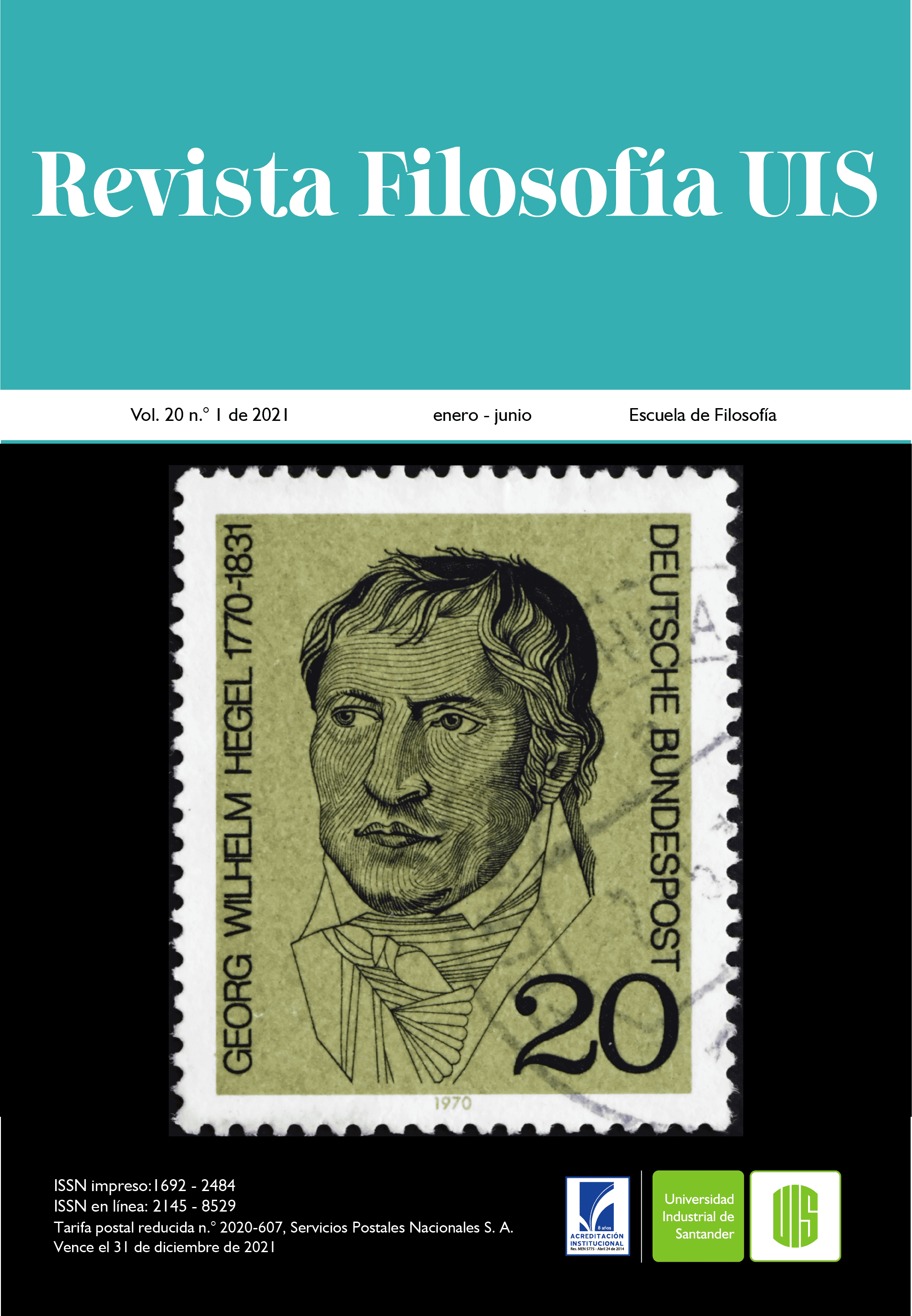Publicado 01-01-2021
Palabras clave
- parricidio,
- nombre propio,
- filosofía,
- pensamiento,
- extranjero
Cómo citar
Derechos de autor 2021 Germán Osvaldo Prósperi

Esta obra está bajo una licencia internacional Creative Commons Atribución 4.0.
Resumen
El objetivo de este artículo consiste en mostrar que no basta con cuestionar las opiniones establecidas y con argumentar dialécticamente para adoptar una actitud filosófica; es preciso además matar al Padre, es decir asumir un nombre propio, un lugar de enunciación que conlleva una colisión más o menos polémica con los pensadores con quienes dialogamos. Si Sócrates representa la figura del tábano que cuestiona y persuade, el Extranjero del Sofista representa la figura del parricida. Sostendré entonces que la actitud filosófica solo puede explicarse en toda su amplitud y profundidad a partir de estas dos figuras. Asimismo, mostraré que la institución académica tiende a privilegiar la figura del tábano en detrimento de la figura del parricida.
Descargas
Citas
- Adorno, F. (1978). Introduzione a Socrate. Laterza.
- Agamben, G. (2005a). Profanazioni. Nottetempo.
- Agamben, G. (2005b). La potenza del pensiero. Saggi e conferenze. Neri Pozza.
- Agamben, G. (2006). Che cos’è un dispositivo? Nottetempo.
- Beauvoir, S. de (1949). Le deuxième sexe. Gallimard.
- Borges, J. L. (1974). Obras completas. Emecé.
- Braunstein, N. (2003). Desire and jouissance in the teachings of Lacan. En J-M. Rabaté (Ed.), The Cambridge Companion to Lacan (pp. 102-115). Cambridge University Press.
- Brickhouse, T. y Smith, N. (2000). The Philosophy of Socrates. Westview Press.
- Burnet, J. (1916). Proceedings of the British Academy. Vol. 7. En The Socratic Doctrine of the Soul, (pp. 3-27). British Academy.
- Burnet, J. (1928). Greek Philosophy. Part I: Thales to Plato. MacMillan.
- Cléro, J-P. (2002). Le Vocabulaire de Lacan. Ellipses.
- Cornford, F. M. (1935). Plato’s Theory of Knowledge. The Theaetetus and the Sophist of Plato translated with a running commentary. Kegan Paul, Trench, Trubner & Co.
- Cornford, F. M. (1966). Before and After Socrates. Cambridge University Press.
- De Rick, L. M. (1986). Plato’s Sophist. A Philosophical Commentary. North-Holland Publishing Company.
- Deleuze, G. (1962). Nietzsche et la philosophie. P.U.F.
- Deleuze, G. (1990). Pourparlers. 1972-1990. Les Éditions de Minuit.
- Deleuze, G. (1993). Critique et clinique. Les Éditions de Minuit.
- Deleuze, G. (2002). L’île déserte et autres textes: Textes et entretiens 1953-1974. Les Éditions de Minuit.
- Deleuze, G. y Guattari, F. (1980). Mille plateaux. Les Éditions de Minuit.
- Deleuze, G. y Parnet, C. (1996). Dialogues. Flammarion.
- Derrida, J. (1992). This strange institution called ‘literature’: An interview with Jacques Derrida. En D. Attridge (Ed.), Acts of Literature (pp. 33-75). Routledge.
- Derrida, J. (2005). Otobiographies: L'enseignement de Nietzsche et la politique du nom propre. Galilée.
- Di Ciaccia, A. y Recalcati, M. (2000). Jacques Lacan. Un insegnamento sul sapere dell’inconscio. Bruno Mondadori.
- Esposito, R. (2007). Terza persona. Politica della vita e filosofía dell’impersonale. Einaudi.
- Festugière, A. J. (1996). Socrate. La Table Ronde.
- Foucault, M. (1971). Le «non» du père. En Dits et écrits I (pp. 192-195). Gallimard.
- Foucault, M. (1984). Histoire de la sexualité II – L’usage des plaisirs. Gallimard.
- Guthrie, W. K. C. (1971). Socrates. Cambridge University Press.
- Hadot, P. (1995). Qu’est-ce que la philosophie antique? Gallimard.
- Hadot, P. (2004). Eloge de Socrate. Éditions Allia.
- Heidegger, M. (1977). Holzwege. En Gesaumtausgabe, Band 5. Vittorio Klostermann.
- Klaniczay, G. y Pócs, É. (Eds.). Demons, Spirits, Witches. Christian Demonology and Popular Mythology, Vol. II. Central European University Press.
- Lacan, J. (1966). Écrits. Éditions du Seuil.
- Laplanche, J. (1961). Hölderlin et la question du père. P.U.F.
- Leader, D. (2003). Lacan’s myths. En J.-M. Rabaté (Ed.). The Cambridge Companion to Lacan (pp. 35-49). Cambridge University Press.
- Marshall, L. (2017). Gadfly or Spur? The meaning of Myops in Plato’s Apology of Socrates. Journal of Hellenic Studies, 137, 163–174.
- Mattéi, J.-F. (1983). L’Etranger et le simulacre: Essai sur la fondation de l’ontologie platonicienne. P.U.F.
- Morrison, D. R. (2011). Editor’s Preface. En D. R. Morrison (Ed.), The Cambridge Companion to Socrates (pp. xiii-xv). Cambridge University Press.
- O’Brien, D. (2013). Does Plato refute Parmenides? En B. Bossi, y T. M. Robinson (Eds.), Plato’s Sophist Revisited (pp. 117-155). Walter de Gruyter.
- Otto, W. (2005). Socrate e l’uomo greco. Christian Marinotti Edizioni.
- Plant, B. (2012). This strange institution called ‘philosophy’: Derrida and the primacy of metaphilosophy. Philosophy and Social Criticism, 38(3), 257–288.
- Platón (1985). Apología de Sócrates. En Diálogos I. (J. Calonge Ruiz, trad.). Gredos.
- Platón (1988a). Diálogos V. En Sofista. (N. L. Cordero, trad.). Gredos.
- Platón (1988b). Diálogos V. En Teeteto. (A. Vallejo Campos, trad.). Gredos.
- Prósperi, G. O. (2019). La máquina óptica. Antropología del fantasma y (extra)ontología de la imaginación. Miño y Dávila Editores.
- Reale, G. (2000). Socrate. Alla scoperta della sapienza umana. RCS Libri.
- Rosen, S. (1999). Plato’s Sophist. The Drama of Original and Image. St. Augustine’s Press.
- Sartre, J. P. (1946). L’existentialisme est un humanisme. Nagel.
- Scott, G. A. (2000). Plato’s Socrates as Educator. State University of New York Press.
- Tarizzo, D. (2003). Introduzione a Lacan. Nottetempo.
- Timotin, A. (2011). La démonologie platonicienne: Histoire de la notion de daimōn de Platon aux derniers néoplatoniciens. Brill.
- Trakl, G. (1915). Sebastian im Traum. Kurt Wolff Verlag.
- Van Kiel, G. (2005). Socrates’ Daemon: Internalisation of the Divine and Knowledge of the Self. Apeiron, 38(2), 31-42. https://doi.org/10.1515/APEIRON.2005.38.2.31
- Vlastos, G. (1991). Socrates. Ironist and Moral philosopher. Cambridge University Press.

